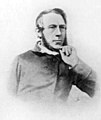Wikipedia:Selected anniversaries/March 2
This is a list of selected March 2 anniversaries that appear in the "On this day" section of the Main Page. To suggest a new item, in most cases, you can be bold and edit this page. Please read the selected anniversaries guidelines before making your edit. However, if your addition might be controversial or on a day that is or will soon be on the Main Page, please post your suggestion on the talk page instead.
Please note that the events listed on the Main Page are chosen based more on relative article quality and to maintain a mix of topics, not based solely on how important or significant their subjects are. Only four to five events are posted at a time and thus not everything that is "most important and significant" can be listed. In addition, an event is generally not posted this year if it is also the subject of the scheduled featured article or picture of the day.
To report an error when this appears on the Main Page, see Main Page errors. Please remember that this list defers to the supporting articles, so it is best to achieve consensus and make any necessary changes there first.
Images
Use only ONE image at a time
-
Claude Chappe
-
Replica of one of Claude Chappe's semaphore towers
-
King Kong film poster
-
João Bernardo Vieira
-
Vladimír Remek
-
Carl Sylvius Völkner
Ineligible
| Blurb | Reason |
|---|---|
| 1917 – U.S. president Woodrow Wilson signed the Jones–Shafroth Act into law, granting United States citizenship to every citizen of Puerto Rico. | expansion, refimprove section |
| 1933 – The film King Kong premiered at Radio City Music Hall in New York City. | refimprove, expansion |
| 1939 – Italian Cardinal Eugenio Pacelli was elected as Pope and took the name Pius XII. | neutrality issues |
| 1970 – Rhodesia formally broke its links with the British crown and declared itself a republic. | refimprove section |
| 1992 – By virtue of gaining membership to the United Nations, Moldova gained international recognition as an independent nation. | refimprove |
| 2009 – President of Guinea-Bissau João Bernardo Vieira was assassinated in an attack by a group of soldiers on his private residence in Bissau. | refimprove section |
Eligible
- 1444 – The League of Lezhë, an alliance of regional chieftains, was established in Venetian Albania with Skanderbeg as their commander.
- 1791 – French inventor Claude Chappe and his brothers first demonstrated the semaphore telegraph, a system to convey information by means of visual signals, using towers with pivoting crossarms.
- 1836 – Texas Revolution: At a convention of delegates in Washington-on-the-Brazos, the Mexican state of Texas adopted a declaration of independence, establishing the Republic of Texas.
- 1859 – The Great Slave Auction, the largest single sale of slaves in U.S. history, with more than 400 people sold, began in Georgia.
- 1865 – New Zealand Wars: Carl Sylvius Völkner, a Protestant missionary, was killed by Hauhau militants in Ōpōtiki for working as an agent for New Zealand governor-general George Grey.
- 1877 – The Electoral Commission awarded twenty disputed electoral votes to Rutherford B. Hayes, thus assuring his victory in the 1876 U.S. presidential election.
- 1901 – U.S. Steel, the first billion-dollar corporation and once the world's largest producer of steel, was founded by financier J. P. Morgan.
- 1919 – Communist, revolutionary-socialist, and syndicalist delegates met in Moscow to establish the Communist International.
- 1937 – The Steel Workers Organizing Committee, the precursor of the United Steel Workers of America, had a major success when it signed a collective-bargaining agreement with U.S. Steel.
- 1943 – World War II: Australian and U.S. air forces attacked and destroyed a large Japanese naval convoy in the Bismarck Sea, north of Papua New Guinea.
- 1962 – Led by General Ne Win, the Burmese military seized power in a coup d'état.
- 1965 – Vietnam War: The American and South Vietnamese air forces began Operation Rolling Thunder, a sustained bombing campaign against North Vietnam that eventually became the most intense air–ground battle waged during the Cold War period.
- 1965 – The Sound of Music is released in American theatres; it later became the highest grossing film of all time.
- 1978 – As a cosmonaut on Soyuz 28, Czechoslovak military pilot Vladimír Remek (pictured) became the first person from outside the Soviet Union or the United States to go into space.
- 1995 – Researchers at Fermilab in Illinois announced the discovery of the top quark, the most massive of all observed elementary particles.
- 2017 – A naming ceremony for the chemical elements moscovium, tennessine, and oganesson took place at the Russian Academy of Sciences in Moscow.
- Born/died: | Hasan ibn Ali |b|625| Charles the Good |d|1127| George Sandys |b|1578| William Murray, 1st Earl of Mansfield |b|1705| Louis-Gabriel Suchet |b|1770| Susanna M. Salter |b|1860| James A. Gilmore |b|1876| Grete Hermann |b|1901| Gisela Januszewska |d|1943| Lionel Matthews |d|1944| Dusty Springfield |d|1999
- 1484 – The College of Arms, one of the few remaining official heraldic authorities in Europe, was incorporated by royal charter in the City of London.
- 1776 – American Revolutionary War: Patriot militiamen from Georgia and South Carolina attempted to resist the British action to seize and remove supply ships anchored at Savannah, Georgia.
- 1949 – The B-50 Superfortress Lucky Lady II landed in Fort Worth, Texas, to complete the first non-stop circumnavigation of the world by airplane.
- 1962 – Playing for the Philadelphia Warriors, American basketball player Wilt Chamberlain (pictured) scored 100 points in a game against the New York Knicks, which remains an NBA record.
- 2022 – Russian forces captured the city of Kherson, the only regional capital to be taken during the Russian invasion of Ukraine.
- Pope Adrian VI (b. 1459)
- Alexander Bullock (b. 1816)
- Bedřich Smetana (b. 1824)
- Ida Maclean (d. 1944)







